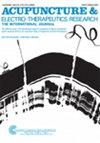质子泵抑制剂联合中药治疗咽喉反流病的随机临床试验
IF 0.4
4区 医学
Q4 INTEGRATIVE & COMPLEMENTARY MEDICINE
Acupuncture & Electro-Therapeutics Research
Pub Date : 2021-01-01
DOI:10.3727/036012921x16321477053845
引用次数: 0
摘要
背景:探讨以经典质子泵抑制剂PPIs治疗咽喉反流病患者是否能取得更好的疗效。方法:选取150例咽喉反流患者,随机分为3组,每组50例。A组患者给予质子泵抑制剂兰索拉唑治疗。B组采用兰索拉唑联合半夏厚朴汤治疗,C组采用针刺治疗和中西医结合治疗。分别于治疗前、治疗后4周和8周评估反流症状指数(RSI)、反流发现评分(RFS)和生活质量(36项简短健康调查问卷)。结果:三组患者治疗后RSI、rfs评分均显著降低(P < 0.001)。8周时,B、C组均低于A组(P < 0.01)。治疗后3组SF 36评分均升高。在4周和8周时(P < 0.001), B组和C组患者的评分高于A组患者(P < 0.001)。B、C组总有效率均高于A组(P < 0.05)。结论:三种治疗方法对该病均有治疗效果,但单用ppii的疗效不如联用。此外,PPI联合半夏厚朴汤和/或针灸治疗可显著改善生活。本文章由计算机程序翻译,如有差异,请以英文原文为准。
A Randomized Clinical Trial of Proton Pump Inhibitors Combined with Traditional Chinese Medicine in the Treatment of Laryngopharyngeal Reflux Disease
Background:To explore whether combined with TCM based on classical proton pumpinhibitors PPIs therapy can achieve better efficacy for patients withlaryngopharyngeal reflux disease. Methods: There were 150 laryngopharyngeal refluxpatients enrolled and divided into three groups randomly, with 50 cases in each group.Patients in group A were treated with the proton pump inhibitor (PPI) lansoprazole.Patients in group B were treated with lansoprazole combined with Banxia Houpudecoction, and patients in group C were treated with acupuncture treatments and acombination of Chinese and Western medicine. The reflux symptom index (RSI), refluxfinding score (RFS), and quality of life (36 item short form health survey questionnaire)were assessed before and 4 and 8 weeks after treatment. Results: The RSI and RFSscores of the three groups were significantly reduced after treatment (P < 0.001). Ingroup B and C, they were lower than in group A at 8 weeks (P < 0.01). The SF 36 scoreof 3 groups increased after treatment. At both 4 and 8 weeks (P < 0.001), and patientsin groups B and C scored higher than patients in group A (P < 0.001). The total effectiverate of group B and group C was higher than that of group A (P < 0.05). Conclusion:All three treatments have therapeutic effects on the disease, but the efficacy of a PPIalone is not as good as the combined treatments’ efficacies. Moreover, PPI combinedwith Banxia Houpu decoction and/or acupuncture treatment substantially affects lifeimprovement.
求助全文
通过发布文献求助,成功后即可免费获取论文全文。
去求助
来源期刊

Acupuncture & Electro-Therapeutics Research
医学-全科医学与补充医学
CiteScore
0.50
自引率
66.70%
发文量
9
审稿时长
>12 weeks
期刊介绍:
The aim of the journal is to provide an international forum for the exchange of ideas and promotion of basic and clinical research in acupuncture, electro-therapeutics, and related fields. The journal was established in order to make acupuncture and electro-therapeutics a universally acceptable branch of medicine through multidisciplinary research based on scientific disciplines. The final goal is to provide a better understanding of both the beneficial and adverse effects of these treatments in order to supplement or improve existing methods of diagnosis, prognosis, treatment, and prevention of diseases in both Western and Oriental medicine.
 求助内容:
求助内容: 应助结果提醒方式:
应助结果提醒方式:


